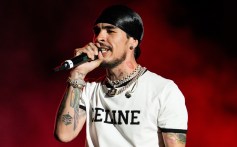Business
Page: 29
Trending on Billboard
In fall 2026, Live Nation will open the 4,400-capacity indoor music venue The Truth in Nashville.
“Live Nation wanted to be sure that we were adding something that was going to speak to the core of Nashville,” Sally Williams, president of Nashville Music & Business Strategy for Live Nation, tells Billboard.
Related
The Truth will be led by general manager Mickey Davis, and will join AJ Capital Partners’ 18-acre, mixed-use Wedgewood Village development in Nashville’s Wedgewood-Houston.
The venue will highlight talent ranging from global headliners to local Nashville favorites representing an array of musical genres. The Truth, designed by Live Nation’s in-house design and development group Blueprint Studio, will offer a flexible floor plan with three levels in close proximity to the stage, with configurations able to accommodate capacities ranging from 1,800 to 4,400, including standing-room and fully-seated shows.
“This is going to give us the flexibility to host everything from comedians who maybe don’t want a standing room audience to bigger shows where people want to stand,” Williams says. “We will shine the light on Nashville, but we’re going to bring in the biggest stars on the planet, too, from outside of Nashville.”
Williams noted that Live Nation’s Blueprint Studio team spent time in Nashville venues and spoke with Nashville artists, music industry members and historians in creating a venue design intended to honor Nashville’s community.
Related
Throughout, the venue will pay homage to Nashville’s music creators. The Truth takes its name from a quote from late country songwriting legend Harlan Howard, who called country music “three chords and the truth.” Howard, known as a writer on classics including Patsy Cline’s “I Fall to Pieces” and the Buck Owens hit “I’ve Got a Tiger by the Tail,” is also honored through the venue’s whiskey bar, named Harlan’s. Howard’s signature quote is also emblazoned on the front of the venue’s building. Having Howard’s legacy represented within the venue is a full-circle moment for Williams, who recalls that when she first moved to Nashville, one of the first events she attended was the annual Harlan Howard Birthday Bash.
“It represents to me the community that I have found,” Williams says. “It was all of these songwriters singing their songs, and everyone supported. To have his quote, to have people talking about him, means they are talking about songwriters in general, which means they are talking about the foundation of our community. I am beyond proud of that, because I think those are things that we, as a city, have to hold on to.”
The Truth’s two-level, up to 300-person capacity listening lounge, Vinyl Room, will offer a space for gathering and listening to music. Williams tells Billboard that United Record Pressing will be involved in curating vinyls to be displayed in The Truth, as well as providing music for Vinyl Room and the venue’s five backstage dressing rooms. Williams says the Vinyl Room will also be a space that can hold VIP listening sessions and other similar events.
Related
The food and drink menus will highlight local Nashville whiskeys and spirits. Meanwhile, Live Nation teamed with Isle of Printing’s Bryce McCloud to add another visual element to the venue.
“We are going to have an old-school letterpress printing set lists each night for fans to buy and take home,” Williams says. “Set lists are going to be our sort of living art exhibit backstage, too, because every time a show plays here, we will put the set list up and as we move along, it will tell our story visually.”
The backstage will also be outfitted with a family and friends suite overlooking the stage, a large crew lounge, an artist game room/lounge, a multi-use production room and an intimate industry suite.
Live Nation also hopes to hold local music industry events at the venue, such as industry awards and other charitable gatherings.
Related
“People are going to begin to feel like this is their venue, which is what they’re hoping for,” Williams says. “The mission has been to create something other than the sort of box with a stage that you could put anywhere in the world. We wanted to do something completely Nashville-centric.”
The Truth will join other Live Nation venues in Nashville, including Brooklyn Bowl Nashville and Ascend Amphitheater.
Billboard‘s Live Music Summit will be held in Los Angeles on Nov. 3. For tickets and more information, visit https://www.billboardlivemusicsummit.com/2025/home-launch.
Trending on Billboard
Powerhouse regional Mexican label Rancho Humilde is locked in a bitter legal dispute with one of its fastest rising acts, the California-based band Fuerza Regida.
Rancho Humilde filed a lawsuit in September accusing the band of breaching its record deal by unilaterally doing features for other artists and inking live performance contracts with Apple Music and Live Nation. Fuerza Regida countersued a month later, alleging the indie label withheld millions of dollars in royalties and tried to “sabotage” its success — including by leaving it off Latin Grammy Awards submissions.
Related
The dueling legal claims, moved from a California state courthouse to federal court on Oct. 20, reveal a stunning breakdown in the relationship between Fuerza Regida and its longtime label home. The fight comes just as Fuerza Regida’s star is on the rise; the band made history in May when 111XPANTIA debuted at No. 2 on the Billboard 200, making it the highest-charting Spanish-language album ever by a duo or group.
Fuerza Regida, a quintet of regional Mexican hitmakers from San Bernardino, signed with Jimmy Humilde’s label in 2018. The band now puts out music via a joint venture between Rancho Humilde and its own Street Mob Records, with distribution by Sony Music Latin.
Rancho Humilde’s lawsuit is focused on exclusivity language in the label’s original record deal with Fuerza Regida, which allegedly entitled the label to a seat at the table and a cut of proceeds for all recording and touring contracts. According to Rancho Humilde, Fuerza Regida violated this deal by performing unauthorized features for other artists and not sharing the royalties.
The lawsuit lists 27 offending songs, including “Qué Onda,” Fuerza Regida’s Billboard Hot 100 entry from 2023 with Calle 24 and Chino Pacas, and “Modo Capone,” the band’s 2024 collaboration with Pacas and Drake that hit No. 11 on Billboard‘s Hot Latin Songs chart.
Related
Rancho Humilde says Fuerza Regida also disregarded exclusivity by contracting directly with Apple Music this past summer for a live concert taping in Mexico City, as well as with Live Nation for U.S. tours in 2023 and 2024.
“[Rancho Humilde] has suffered damages, including, but not limited to, lost royalties, advances, fees, market-share and other compensation that should have been directed to Sony and accounted to [Rancho Humilde], lost shares of touring revenues [and] lost income from unauthorized deals such as the Apple agreement,” says the lawsuit. “The exact amount of damages is subject to proof at trial but exceeds $15 million.”
Fuerza Regida, however, tells a very different story in its countersuit. The band claims Rancho Humilde is actually the one who has breached their record deal by failing to pay millions of dollars in royalties and stonewalling audit requests.
The countersuit also says Rancho Humilde has engaged in “systematic financial malfeasance” by refusing to revert master recordings back to the band as required by the record deal, as well as by using “clandestine arrangements” with Live Nation to siphon off touring profits.
Related
“In addition to its fraudulent schemes and systematic contract breaches, Rancho and its principal Jimmy Humilde escalated to a malicious campaign of active sabotage designed to destroy [Fuerza Regida’s] professional relationships and career opportunities within the entertainment industry,” reads the countersuit.
Fuerza Regida says that as part of this campaign of “sabotage,” Rancho Humilde requested that Sony remove the band from Latin Grammy Awards submissions in 2024, even though they had been a top-selling act that year.
Additionally, the countersuit claims Jimmy Humilde sent “threatening and intimidating text messages” to Apple’s head of Latin music in an attempt to “derail” Fuerza Regida’s live concert taping. Overall, Fuerza Regida is seeking at least $25 million in damages from the label.
In a statement to Billboard on Monday (Oct. 27), the band’s attorney Kenneth D. Freundlich says, “Rancho Humilde and Jimmy Humilde have for years engaged in brazen self-dealing, enriching itself at the expense of our client Fuerza Regida.”
Related
“Rancho’s bad faith state court lawsuit against Fuerza was the last straw,” adds Freundlich. “After our removal, the disputes will air in federal court where Rancho must now respond to our detailed claims of wrongdoing.”
Reps for Rancho Humilde did not return a request for comment.
The Fuerza Regida fight is not Rancho Humilde’s only ongoing legal battle with top talent. Regional Mexican artist Codiciado, who was signed to Rancho Humilde as part of the ensemble Grupo Codiciado but has since parted ways and gone solo, sued the label in June, alleging it infringed his intellectual property by getting the rest of the band back together with a new act called Los Codicia2. Rancho Humilde has not yet responded to Codiciado’s claims.
Trending on Billboard Face value ticket exchange CashorTrade has added two major names to its leadership ranks as the fan-first ticketing platform continues to gain traction across the live music industry. Industry veterans Andrew Dreskin — best known as co-founder and former CEO of Ticketfly and TicketWeb — and Craig Snyder, formerly of Intellitix and […]
Trending on Billboard Amsterdam Dance Event (ADE) took place in the Dutch capital last week (Oct. 22-26), with the city’s vibrant dance and electronic scene taking over bars, clubs and venues for a week of performances, panels and professional networking. It’s not an overstatement to suggest that the city, a diverse and fun-loving hub of […]
Source: Anadolu / Getty
The retail giant Target announced internally that they would be cutting 1,800 corporate jobs throughout the company, in response to combatting slumping sales due to a boycott of Target by the public over its rollback on diversity, equity, and inclusion (DEI) initiatives. The round of layoffs is the first for the company in a decade.
According to reports, the announcement was in an internal memo by incoming CEO Michael Fiddelke sent to employees at Target’s headquarters in Minneapolis, Minnesota, last Thursday (Oct. 23). The plan is for 1,000 employees to be laid off, with another 800 unfilled positions that will be eliminated permanently. That constitutes an 8% cut to Target’s workforce, a spokesman said. Those targeted by the layoffs will be notified Tuesday (Oct. 28), and will receive severance packages along with salary and benefits until Jan. 3, 2026.
Target has been under fire since January, after its decision to roll back its DEI initiatives after President Donald Trump signed executive orders banning them. These initiatives included a pledge to have Black employees as 20% of its workforce over three years and promoting programs featuring Black and other minority creators. That led to a call for a boycott from Black faith leaders, including Pastor Jamal Bryant, and a 24-hour boycott on Feb. 28 by The People’s Union USA.“The truth is, the complexity we’ve created over time has been holding us back,” Fiddelke said in the memo. “Too many layers and overlapping work have slowed decisions, making it harder to bring ideas to life.” He acknowledged that the cuts are difficult, but “a necessary step in building the future of Target and enabling the progress and growth we all want to see.”
Target has been struggling with earnings since January, with its stock falling by $27.27 per share since the end of February, wiping out $12.4 billion in market value. The company has stated that it expects sales to decline again this year. There was also a significant shift in consumer traffic – its walk-in traffic dropped 11% from figures recorded last year. And its website traffic also reflects a drop of 9% from 5.2 million to 4.7 million web users, with a drop in mobile app usage from 4.2 million to 3.5 million.
Trending on Billboard
Taylor Swift, who seems to break industry records with every album and tour, just had the career week of her lifetime: in its first week of availability, her latest album, The Life of A Showgirl, rang up about $135 million in revenue, Billboard estimates.
Related
That total revenue number comes from the album’s massive first-week haul — it debuted with 4.002 million equivalent album units, according to Luminate, the only album to pass 4 million in the modern era, and accounted for 50.01% of all current albums in the U.S. that week — but also to an overdrive marketing campaign launched by the Swift camp and her record label, Republic. While global album unit numbers are not available through Luminate, in its first week of availability, the songs on The Life of A Showgirl garnered 1.4 billion global streams, which Billboard calculates by adding up Luminate global stream counts reported for each song on the album.
The Showgirl album came with 38 variants across about a dozen different editions. That included a number of different colored vinyl versions — with each including add-ons like a poster or autographed photos or an acoustic bonus track — with several limited editions or deluxe versions as well. Those variants drove an incredible buying frenzy among Swift fans. What’s more, most of those variants — because of the extra bells and whistles — resulted in wholesale prices above cost levels usually offered to retailers for CD and vinyl formats.
Since the preorder launch in August, most of the editions exclusive to Swift’s webstore were sold for limited windows of time. Target had an exclusive CD, and there was one widely available standard CD, while four CD variants with bonus tracks launched during street week and were initially exclusively sold in Swift’s webstore, before becoming available at indie record stores.
But the biggest revenue driver is that non-traditional channels — online CD stores like Amazon and the official Taylor Swift webstore, as well as Christian stores and chains like Urban Outfitters — accounted for 70% of all the album’s consumption units. Within that, Billboard estimates that Swift’s own store garnered the overwhelming bulk of that, or more than 65% market share of Showgirl’s total first week of 4.002 million album consumption units.
Related
That provided another revenue boost in that the Swift store charged retail pricing, similar to what brick and mortar stores were charging, rather than a wholesale price. For example, while retailers say the wholesale price for the Swift vinyl was $23.49 and $10.34 for CDs, the Swift webstore sold the vinyl album for $29.99, or 27.6% above wholesale; and the CD for $12.99, or 25.6% above wholesale. In other words, the albums sold through Swift’s webstore delivered at least 25% higher per-unit revenue than what she received from brick-and-mortar retail, giving her and Republic a higher profit margin. (Republic Records did not respond to a request for comment.)
The Swift store also offered two CD box sets, which featured the album bundled with a Showgirl hoodie and a Showgirl cardigan, priced at $65 to $70, respectively, delivering even more revenue.
All told, Showgirl sold 1.76 million CDs, 1.334 million vinyl album copies, 358,000 album downloads and 26,000 cassette albums and accumulated 523,000 stream equivalent albums in the U.S., thanks to the album’s nearly 682 million on-demand streams in the first week, according to Luminate. Setting aside streams, the sales figures accounted for 71% of all the albums sold in the U.S. that week; 77% of all CDs sold; 66% of all vinyl sold; 58% of all digital albums sold; and 72% of all physical albums sold.
Even Showgirl’s streams are doing somewhat better in terms of revenue than a typical pop album. For example, her streaming equivalent album units break out to 1,306 streams per unit, while an album like the Kpop Demon Hunters soundtrack averaged 1,423 streams per stream equivalent album (SEA).
What’s the significance of this? The industry and Luminate count 1,250 paid streams per one streaming consumption unit, and 3,750 ad-supported streams per one streaming consumption unit. So the closer the number of streams is to the 1,250 paid streams count — such as Showgirl’s 1,306 streams — shows that her fans were mainly accessing her music through a paid service, while the Kpop Demon Hunters album was somewhat more dependent on the lower-paying ad-supported per-stream rate.
Related
So how does that add up to $135 million? Considering retail pricing on her webstore, wholesale prices quoted from merchants, the standard wholesale cost for downloads (70% of retail) and the standard blended rate of $0.0053 per stream, Billboard calculates that in its debut week, Showgirl accumulated $80 million in revenue in the U.S. for Republic and Swift. Extrapolating for global activity, Billboard estimates that total revenue totaled about $135 million for its debut week.
Still, as amazing as that debut week was, her catalog so far this year is still trailing the torrid pace her music set in the prior two years, when her Eras Tour and The Tortured Poets Department album drove incredible business for her entire catalog. So far in 2025, her full catalog’s total U.S. album consumption units, including the contributions from Showgirls’ record-breaking first week, stands at 11.23 million units as of the week ending Oct. 16, or week 41 in Luminate calendar year terms. At the end of the 41st week last year, her catalog had accumulated 15 million units; in 2023, it stood at 12.3 million units.
By the end of those two years, she wound up with nearly 19 million album consumption units each year in the U.S. To put that number into perspective, Swift’s 37.4 million U.S. album consumption units across those two years dwarf Drake‘s figure of nearly 16 million album consumption units in the U.S. Globally, Swift’s catalog racked up 90.3 billion streams during the period, compared to Drake’s 36.7 billion global streams.
Related
During those two years of 2023 and 2024, Billboard estimates that the entire Swift catalog annually averaged about $350 million in revenue. So far this year, Swift’s catalog, including Showgirl, has generated around $265 million. That catalog estimate also includes revenue from activity from the second week of Showgirl‘s availability, which clocked in at nearly 339,000 album consumption units, including 1,000 track equivalent albums, bringing total sales of the album to 4.3 million units as of the week ending Oct. 16.
Another financial wrinkle: While most artists on major labels are still tied to a royalty rate percentage or, for superstars, a profit-sharing arrangement, Swift owns her entire catalog. That means that for physical product, she is likely reaping at least 70% of revenue collected after production, distribution and marketing fees are paid to Republic and Universal. For digital downloads and streaming, she might be realizing 85% to 90% of such revenue collected by UMG, or maybe even slightly above 90%.
And all of that is without calculating her music publishing — which in the case of 2023 and 2024 combined could be in the range of $100 million to $200 million, depending on her share of the songwriting — and merchandise, which could bring in untold additional millions. Across 30 different Showgirl-themed pieces of merch through her webstore, the numbers could be mind-boggling.
Trending on Billboard
From tour sponsorships to Taco Bell commercials featuring Turnstile, major companies see billion-dollar branding opportunities in partnering with artists, and a new study from Luminate has some matchmaking suggestions.
The industry-leading music analytics platform looked at five years’ worth of survey results and metrics measuring likability, awareness and brand endorsement to determine the best artists to market sodas, snack foods, cosmetics and credit cards. “Cultural capital isn’t something brands should tap into retroactively,” the report authors write. “Behavioral audience entertainment data can inform marketers, helping them to locate artists whose fan base matches a brand’s target audience. Think of it as ‘moneyball’ for brand partnerships.”
Related
Luminate has collected quarterly online survey results from a representative slice of U.S. consumers, ages 13 and up, since 2021. It identified super-purchasers of food & beverage, personal care & hygiene, travel, telecom, mobile apps and banking & finance products, and analyzed the survey results and other metrics to understand their attitudes and perceptions toward some 600 artists and 100 music genres and sub-genres.
The study deliberately stayed away from megastars like Taylor Swift and instead identified artists who may be less well known, but who among certain groups are well-liked and trusted, and therefore could provide brands with a better return on their marketing dollars, says Grant Gregory, a researcher and manager at Insights at Luminate.
“The decision-making process was a mix of identifying artists with high likability AND artists who are uniquely appealing (in terms of likability) or have uniquely high reach (in terms of awareness) among that category purchasing group vs. the general population,” says Gregory.
The artists who scored among the highest in each consumer category were: country crossover star Bailey Zimmerman for food and beverage products, the queen of regional Mexican music Ana Bárbara for personal care & hygiene products, rising country star Lainey Wilson for banking and finance, Bebe Rexha for telecom, Jamaican singer and rapper Shenseea for service and e-commerce apps such as ride hailing and food delivery and electronic artist Kenya Grace for travel.
Here are some of the highlights from the report.
Bailey Zimmerman
The study plotted the “Fall in Love” singer’s likability and brand endorsement scores from survey respondents who bought at least three packaged snacks, coffee or other food products recently. Zimmerman outscored JENNIE, Leon Thomas, Dolly Parton and Queen as a good bet for marketers. While Chris Stapleton had the highest awareness score, Zimmerman won on likability. His fans tend to be younger and more affluent than the overall population and are more likely to listen to music at least twice a week on Apple Music and Spotify.
“Zimmerman presents a narrower but deeper fandom among category buyers,” Luminate’s authors found, while “Stapleton offers a broader though still highly efficient fandom.”
Ana Bárbara
The longtime grupero singer/songwriter Bárbara beat Young Miko, Arya Starr and Dolly Parton when it came to her strength as a personal care product brand endorser, with only Parton beating her on likability. Bárbara scored particularly well in awareness, perhaps due to the current popularity of regional Mexican music. She over-indexes with Millennial, Gen X and even Gen Z consumers, and fan devotion is particularly strong. Those audiences are more likely than most to use social media apps, including TikTok and Instagram.
Lainey Wilson
Wilson falls in the middle of a pack of superstars that includes Stevie Nicks and Kelly Clarkson, who both rank slightly ahead of Wilson on awareness. However, Clarkson ranks high on awareness and public perception but in the average range for fan engagement metrics. Wilson ranked among the highest for likability and purchase likelihood.
Wilson’s fans also tend to have higher-than-average income, with 38% earning more than $75,000 a year, compared to the general population, and more than three-quarters of the banking and financial product consumers surveyed said they would be more likely to buy a product she endorsed, the report found.
Bebe Rexha
“Recognizable, out-of-the-limelight performers such as Bebe Rexha can still shine through in the data,” Luminate’s report found. The Brooklyn born “Meant To Be” singer has had four top 10 songs on the Billboard Hot 100, and her audience tends to skew young, with roughly two-thirds being from the Gen Z and Millennial generations. This audience is more likely than the general audience to use a streaming service like Amazon Prime Video, Netflix or HBO Max at least weekly, and 60% reported they would use a telecom product if she endorsed it. Among the general population, 42% said they would try a telecom product Rexha endorsed.
Shenseea
The Jamaican dancehall singer/rapper is among the best artists to market to a mobile app like Seamless, Uber or Airbnb, Luminate found. While Leon Thomas and Adele ranked slightly higher on likability scores among mobile app super-consumers — defined as people who use two or more mobile apps for services, such as food delivery or ride-hailing — 78% of those consumers who are aware of Shenseea said they would try an app if she endorsed it. That group tends to be more racially diverse, come from the Millennial and Gen X generations and they’re active across social media platforms, the report found.
Kenya Grace
The South African-born British electronic music singer Kenya Grace ranked is less well-known than Shenseea, Lola Young or Riley Green, but Luminate found that her U.S. audience looks a lot like the people travel companies want to target. Their annual incomes are more likely than most to be middle-to-high, with 61% making more than $50,000 annually, compared to less than half of the general population, and Grace’s audience frequently uses video streaming services like Disney+ or YouTube –appealing places for travel companies to advertise.
Trending on Billboard
Former Oak View Group CEO and longtime sports-entertainment executive Tim Leiweke is asking a federal judge for permission to travel to Canada for business next month — a routine motion on paper that underscores how sharply life changes once an executive is indicted in federal court.
According to an unopposed motion filed Tuesday (Oct. 21) in the U.S. District Court for the Western District of Texas, Leiweke has requested permission to travel to Toronto and Hamilton, Ontario, where his company is developing a major arena and entertainment district project. Hoping to be in Canada from Nov. 17-22 to attend business meetings connected to his Denver-based development company Oak View Group (OVG), the filing notes that Leiweke previously surrendered his passport to pre-trial services in Denver but needs temporary access to travel abroad. His probation officer and the U.S. Department of Justice have both indicated they do not oppose the request.
Related
Leiweke, 68, was arraigned in July and pleaded not guilty to a single count of violating the Sherman Antitrust Act, a charge that carries a maximum penalty of 10 years in prison and a $1 million fine. The case stems from a federal grand-jury indictment alleging that Leiweke and executives from Legends Hospitality conspired to rig the bidding process for the Moody Center, a $375 million arena project at the University of Texas in Austin that opened in 2022. Leiweke’s defense has strongly denied any wrongdoing, arguing that OVG and Legends worked independently and that the DOJ is misapplying antitrust law to a deal that, in practice, produced one of the most successful university-arena partnerships in the country.
“Tim and OVG won in Austin by competing fair and square and they delivered fantastic value and a world class arena to the university,” a spokesperson for Leiweke tells Billboard.
Earlier this month, Leiweke’s attorney, David Gerger, filed a separate motion seeking to delay the trial until at least October 2026, citing the need to review more than seven million pages of evidence turned over by prosecutors. Gerger also signaled that the defense will challenge the government’s interpretation of antitrust law as applied to the Moody Center deal.
“Life Doesn’t Go On as Normal”
While Leiweke continues to run his private ventures, his day-to-day life is now dictated by court supervision. To understand what that looks like, Billboard spoke with Justin Paperny, director of White Collar Advice, a Los Angeles-based firm that coaches high-profile defendants through the pre-trial and sentencing process.
Related
“Life doesn’t go on as normal, not when you have a pre-trial services officer to report to,” Paperny said. “You’re under the microscope of the United States government. They don’t view you as a law-abiding citizen anymore — they view you as someone who broke the law. Traveling internationally, even to Canada, becomes very difficult.”
Paperny, a former stockbroker who himself served time in federal prison (for stock fraud) and who has attended more than 1,500 sentencing hearings nationwide, said the first shock for most white-collar defendants is how restrictive their world becomes overnight. “Every trip has to be approved. Every contact with law enforcement has to be disclosed. For entrepreneurs used to running the show, it’s a massive adjustment,” he said.
Even seemingly minor infractions — a missed call, a traffic ticket not reported — can lead to problems with pre-trial services. “If you get off to a good start, things go smoothly,” Paperny said. “But if you violate even small conditions, the government loses trust quickly.”
Paperny describes the process as bureaucratic but rigid. Defendants on bond must check in regularly with probation officers, report changes in residence or employment, and request written approval for all travel outside their home district.
Related
“You’re dealing with a bureaucrat who has a job to do,” he said. “They’ll ask about mental-health issues, substance abuse, where you live, what you earn, and they’ll lay out very specific conditions. It’s black and white: if you follow them, things can be fine. If not, you’ll feel the consequences.”
Leiweke’s motion illustrates the point. His lawyers note that he previously received permission to travel to Europe this summer and complied fully with court orders, returning his passport immediately upon re-entry. Still, every trip requires a fresh petition, paperwork and the sign-off of multiple agencies. “It’s an enormous inconvenience,” Paperny said. “For someone used to doing deals across continents, the red tape is relentless.”
Paperny said travel to Canada is especially difficult for anyone under indictment. “Canada doesn’t like felons or people facing charges,” he says. “Even with a judge’s permission, the country may deny entry. It wouldn’t surprise me if he never sees Canada again during this process.”
The restriction often comes as a shock to executives used to global mobility. “I’ve been invited to work in Toronto multiple times and still can’t go [because of my conviction],” Paperny says. “It’s not personal — it’s just policy. They’ll arrest you at the border and send you back.”
Beyond managing restrictions, Paperny said the smartest defendants treat the pre-trial period as an opportunity to build credibility with the court. “The question isn’t just what you did — it’s what you’re doing now,” he says.
Paperny’s firm encourages clients to create what he calls “assets”: tangible contributions that demonstrate accountability and reform. “You don’t just tell a judge you’ve changed; you show them,” he explains. “That could be writing a book, starting a blog, mentoring others or creating a course that helps people. Judges want evidence that you’re using your time constructively.”
Paperny believes these proactive steps often have real impact at sentencing. “We’ve had clients whose efforts to create value for others literally changed the outcome of their case,” he says. “Judges and prosecutors are human — they respond to genuine progress.”
For now, the case moves slowly. The court has not yet ruled on Leiweke’s travel request, though the government’s lack of opposition suggests it is likely to be approved. The larger trial delay motion remains pending, and legal observers say the defense’s strategy may hinge on narrowing the scope of what the government can present as collusion.
Meanwhile, Leiweke continues to serve as chairman of his own firm, advising on arena and stadium developments around the world. The irony, Paperny notes, is that while Leiweke still operates at the top of the business, his movements and activities remain closely monitored by federal authorities.
“He has to focus on what he can control — his conduct, his compliance, his contribution,” Paperny said. “That’s what will ultimately define how this story ends.”
Trending on Billboard
Recently-launched music company By Design, co-founded and led by music execs Josh Bailey, Jeremy Holley, Rod Riley and Josh Thompson, has partnered with BMG. The new partnership is set to include global distribution, label services, joint label signings and a co-investment strategy that will reach across catalog acquisitions through Archetype Music (a music rights holding company acquiring faith-based music rights).
By Design’s roster currently includes country singer-songwriter Frankie Ballard, as well as pop-folk singer-songwriter Zoe Levert and singer-songwriter Alex Jude. The label is also part of a larger company ecosystem, which includes Archetype Music, and nonprofit organization Blueprint, which aims to equip and empower faith-based creators.
Related
“Faith-driven music has long been of particular interest to many members of the BMG team,” Jon Loba, President of Frontline Recordings, BMG Americas, said in a statement. “Even though we have not specifically engaged in that line of business, there has always been the desire and intention to do so. The opportunity to partner with By Design offered the perfect, complimentary alliance with exceptional, proven industry executives, who have the same heart and artist-first approach to music as BMG. We are so incredibly excited to join forces with Rod, Jeremy, both Josh’s and the entire By Design team, to enter a global genre that is one of the most powerful cultural forces rising today.” “We partnered with BMG to scale purpose-driven music without compromising values,” Thompson said. “Their global reach empowers us to honor each artist’s original design – and share it on a global stage.” “We believe the next global movement in music will be rooted in faith and community, not algorithms and trends,” Bailey added. “With BMG’s international infrastructure and our shared commitment to empowering artists, we’re building a new kind of platform, one that’s both spiritually grounded and globally scaled.”
Related
“By Design exists to champion the creators behind this movement, artists who carry purpose in their message and originality into a culture hungry for meaning,” Holley added.
By Design’s launch comes as the Contemporary Christian Music (CCM) genre has seen a surge. Earlier this year, two CCM songs made simultaneous appearances on Billboard’s all-genre Hot 100, marking the first time two CCM songs have reached that mark simultaneously in 11 years. Those songs were Forrest Frank’s “Your Way’s Better” and the Brandon Lake-Jelly Roll collaboration “Hard Fought Hallelujah.” Earlier this month, Phil Wickham also made his Hot 100 chart debut with the song “What An Awesome God.”
Trending on Billboard
Weeks after Sean “Diddy” Combs was sentenced to over four years in prison on prostitution convictions following a sweeping sexual abuse case, inmate records posted by the federal Bureau of Prisons show that Diddy, 55, is now expected to be set free on May 8, 2028.
Combs had already been expected to serve less than the full sentence, thanks to roughly a year of time-served as he sat in jail awaiting his trial and verdict. But the newly-revealed release date would represent an even-earlier release than previously thought — only roughly two years and seven months after his date of sentencing.
Such dates are just estimates, reflecting the “inmate’s projected release date based on BOP calculations.” The earlier-than-expected date could reflect that Combs will serve the final few months of his sentence at a residential reentry center, or halfway house, or his participation in BOP’s drug abuse rehab program, which can sometimes shave months off an inmate’s sentence.
Related
Reps for Combs did not immediately return a request for comment. Reps for the federal Bureau of Prisons were unavailable for comment, citing the government shutdown.
Once one of the music industry’s most powerful figures, Combs was arrested and charged in September 2024 with racketeering (RICO) and sex trafficking violations. Prosecutors said he ran a sprawling criminal operation aimed at facilitating “freak-offs” — elaborate events which he allegedly forced ex-girlfriend Cassie Ventura and other women to have sex with male escorts while he watched and masturbated.
Following a blockbuster trial this spring, jurors issued a verdict clearing Combs on the RICO and sex trafficking charges that could have seen him sentenced to prison for life. But he was still convicted on two lesser counts for transporting Ventura and others across state lines for the purposes of prostitution.
At a sentencing hearing earlier this month, Judge Arun Subramanian sentenced him to 50 months in prison on those convictions. That was far less than the 11 years sought by prosecutors, but well more than the 14 months his lawyers had asked for. Counting his year of time-served credit, that sentence would seemingly have seen the star released at some point in September or October 2028.
Regardless of BOP estimates, Diddy’s release date could change dramatically if he wins his appeal, which he launched last week at the U.S. Court of Appeals for the Second Circuit. His lawyers will challenge not only the length of his sentence, but also his underlying convictions themselves.
If such arguments are successful – read what Diddy’s lawyers might argue here – he could get out even earlier than May 2028. But the appeals process is often slow, and Combs will likely serve a sizeable chunk of his prison term before the case is even decided.
That is, unless he’s pardoned or commuted by President Donald Trump – the other big factor could significantly change his release timeline. Though Trump confirmed that Diddy’s team reached out to the administration about such an edict, the White House has publicly denied that it is considering clemency for the convicted mogul.

 State Champ Radio
State Champ Radio 










